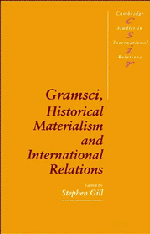Book contents
- Frontmatter
- Contents
- Notes on contributors
- Acknowledgements
- Gramsci and global politics: towards a post-hegemonic research agenda
- PART I PHILOSOPHICAL AND THEORETICAL REFLECTIONS
- 1 Epistemology, ontology, and the ‘Italian School’
- 2 Gramsci, hegemony and international relations: an essay in method
- 3 Alienation, capitalism and the inter-state system: toward a Marxian/Gramscian critique
- 4 Global hegemony and the structural power of capital
- PART II PAST, PRESENT AND FUTURE
- References
- Index
- Titles in the series
3 - Alienation, capitalism and the inter-state system: toward a Marxian/Gramscian critique
Published online by Cambridge University Press: 10 January 2011
- Frontmatter
- Contents
- Notes on contributors
- Acknowledgements
- Gramsci and global politics: towards a post-hegemonic research agenda
- PART I PHILOSOPHICAL AND THEORETICAL REFLECTIONS
- 1 Epistemology, ontology, and the ‘Italian School’
- 2 Gramsci, hegemony and international relations: an essay in method
- 3 Alienation, capitalism and the inter-state system: toward a Marxian/Gramscian critique
- 4 Global hegemony and the structural power of capital
- PART II PAST, PRESENT AND FUTURE
- References
- Index
- Titles in the series
Summary
This chapter presents an interpretation of the radicalised historical ontology characteristic of Marx and Gramsci, and argues that it is possible to understand both the system of sovereign states and the capitalist world economy in non-reductionist ways if the theory of IR/IPE is reconstructed on the basis of a Marxian/Gramscian social ontology. Building upon such a foundation, I will suggest an interpretation of the political relations which underlie the capitalist organisation of production, as well as the inter-state system, and which allow us to understand the historical construction of these relations without a priori reducing one to the other. Viewed from such a perspective, relations among sovereign states can be critically understood as relations of alienation, historically constructed among political communities (states/societies) which are themselves constructed on the basis of relations of alienation (i.e., the corresponding separations of the producer from the means of production, of political from economic relations, etc.).
Marx and Gramsci may be said to have shared a common political commitment which permeated their practices of social inquiry and which constitutes, for me, their primary legacy. Both were engaged in a practice of critique which aimed at uncovering and making explicit a social ontology – a process of social self-creation – which underlies and makes possible the capitalist mode of production, but which is systematically distorted and hidden from view by the characteristic institutional forms and social practices of capitalism.
- Type
- Chapter
- Information
- Publisher: Cambridge University PressPrint publication year: 1993
- 32
- Cited by

